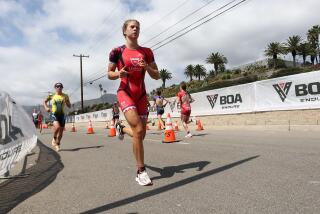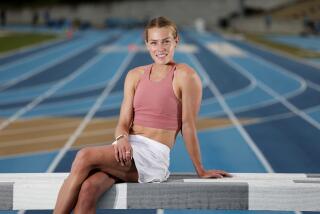For Triathlete Scott Tinley, His Sport Has Become His Business
- Share via
World-class triathlete Scott Tinley knows that the business world isn’t all fun and games.
So Tinley, who has tried to balance business with sports through eight jobs in the past seven years, has struck a career compromise. At 27, he has found a profession where he can make his sport a business: Tinley has become a full-time triathlete.
The formula seemed to work last year when Tinley won 12 major triathlons, including Hawaii’s Ironman, and was named Triathlon magazine’s Triathlete of the year.
He also is vice president of Scott Tinley Performance Wear, a triathlon clothing company. He has modeled for Vogue and is an author. The book, not surprisingly, is called “Winning Triathlon.”
“It hasn’t exactly unfolded as I thought, but I consider myself very lucky to be in the position I’m in,” Tinley said. “I took a gamble on this sport and the gamble’s beginning to pay off.”
But not without some effort.
Tinley doesn’t enter triathlons, he embodies them. He helped promote today’s first Orange County Performing Arts Center Triathlon by speaking last week at a banquet for volunteers and by giving a strategy and safety clinic Saturday. The triathlon begins at Lake Mission Viejo at 7 a.m. Tinley hopes to end up with the $1,500 first-place prize for the men’s professional division and $1,000 as the overall winner.
And perhaps he will bring in some business in the process.
“He’s one of the few athletes that I’ve gotten to know that has a flair (for business) and has a determination, dedication and understanding of what it takes to be successful,” said Jim Riley, Tinley’s business partner and president of Scott Tinley Performance Wear and his own sportswear company, Perfection.
It wasn’t easy climbing this corporate ladder.
When Tinley worked in an office, his daily schedule included bicycling 15 miles, running seven to 12 miles during his lunch hour, and a 3,000-yard swim.
Sound grueling?
Not to Tinley.
He actually enjoyed this rigor the way some people enjoy an after-work set of tennis.
So much so that he left a desk job with Sole International in 1983 to become one of 10 world-class athletes sponsored by Team J. David and Co.
Actually, calling J. David a sponsor is like calling Perino’s a coffee shop.
Tinley and the rest of the team enjoyed lavish hotels, private running and swimming coaches, custom bicycles and racing gear, and a monthly stipend of $1,000 to $1,500.
That all lasted until early 1984, when J. David went bankrupt.
Said Tinley: “It provided some sponsorship that I needed to make the break into full-time training. Then after that, the sport had grown into a good way to make a living.”
In 1984, Tinley returned to Sole International and to the ranks of unsponsored triathletes.
This change had an effect on Tinley’s business venture.
Tinley and Riley met six months after the bankruptcy when they competed in the Ironman. Riley already had established his company and they set up Tinley’s clothing line as soon as they returned to California.
Said Riley: “Even now he’s still gun-shy, in terms of the security of it all. It doesn’t 100% satisfy him. If I had it my way, I’d have him racing much less and in places where (the company) could get more and where he wouldn’t be racing for money.
“But he still sees it important to race for money for his own security, and I don’t knock that.”
And Tinley’s main goal is to win. No matter what.
Tinley took second in the 1985 Nice Triathlon, after falling off his bike twice during the race. He returned home with a badly bruised back and just two weeks to train for the Ironman.
“When he arrived back from Nice, he could hardly walk up the stairs of our house, he was so sore,” Riley said. “And I said to him, ‘There’s no way you’re going to be up for the Ironman.’ ”
It didn’t seem that bad to Tinley.
“There are two kinds of cyclists: Those who have crashed and those who are going to crash,” he said.
He received massage, acupuncture and other treatments before leaving for the Ironman, which he won.
Tinley does have to pay for his double life as businessman and athlete.
He ends each eight-hour training session behind a desk, phoning triathlon directors, scheduling business appointments to promote the company and arranging his schedule for competition.
All that comes after a full day on the street and in the pool.
“No one in the world trains like he trains,” Riley said. “There’s no one. . . . Anyone who bikes over 400 miles a week and runs 75 miles a week and swims 15 miles a week has to have unbelievable discipline.
“This is why he’s thought of so highly by all of the race directors and that’s why he’s the spokesperson for this race.”
Now comes the easy part. All Tinley has to do is swim 1.5 kilometers, bike 35 kilometers and run 10 kilometers. And win.
All in a day’s work.

